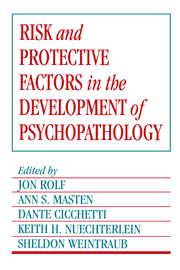Book contents
- Frontmatter
- Contents
- List of contributors
- Preface
- Part I Introduction: Historical and theoretical roots of developmental psychopathology
- Part II Contributions of the high-risk child paradigm: continuities and changes in adaptation during development
- Part III Competence under adversity: individual and family differences in resilience
- Part IV The challenge of adolescence for developmental psychopathology
- Part V Factors in the development of schizophrenia and other severe psychopathology in late adolescence and adulthood
- 18 Family relations as risk factors for the onset and course of schizophrenia
- 19 Long-range schizophrenia forecasting: many a slip twixt cup and lip
- 20 Vulnerability factors in children at risk: anomalies in attentional functioning and social behavior
- 21 Schizophrenia: a new model of its transmission and its variations
- 22 Premorbid competence and the courses and outcomes of psychiatric disorders
- 23 Relationships between adult development and the course of mental disorder
- A closing note: Reflections on the future
- Author index
- Subject index
22 - Premorbid competence and the courses and outcomes of psychiatric disorders
Published online by Cambridge University Press: 06 August 2010
- Frontmatter
- Contents
- List of contributors
- Preface
- Part I Introduction: Historical and theoretical roots of developmental psychopathology
- Part II Contributions of the high-risk child paradigm: continuities and changes in adaptation during development
- Part III Competence under adversity: individual and family differences in resilience
- Part IV The challenge of adolescence for developmental psychopathology
- Part V Factors in the development of schizophrenia and other severe psychopathology in late adolescence and adulthood
- 18 Family relations as risk factors for the onset and course of schizophrenia
- 19 Long-range schizophrenia forecasting: many a slip twixt cup and lip
- 20 Vulnerability factors in children at risk: anomalies in attentional functioning and social behavior
- 21 Schizophrenia: a new model of its transmission and its variations
- 22 Premorbid competence and the courses and outcomes of psychiatric disorders
- 23 Relationships between adult development and the course of mental disorder
- A closing note: Reflections on the future
- Author index
- Subject index
Summary
Research findings in psychopathology teach us that knowledge about human strengths and adaptive capacities is as important as knowledge about vulnerabilities for an adequate prediction of outcome. This emphasis on positive attributes and competence has been a hallmark of Norman Garmezy's research and has been the theme that has connected his earlier work on adult schizophrenia (Garmezy, 1970; Garmezy & Rodnick, 1959) to later studies of coping and stress resistance in groups of children at high risk for psychiatric disorders (Garmezy, 1971, 1983; Garmezy, Masten, Nordstrom, & Ferrarese, 1979; Garmezy, Masten, & Tellegen, 1984; Masten & Garmezy, 1985).
In our work on the developmental approach to psychopathology, we share that concern with competence. In viewing a patient's premorbid competence as a broad, though imperfect, benchmark of maturity level, our assumption is that the premorbid competence construct does not merely designate subtypes (i.e., process vs. reactive) within schizophrenic disorders but is broadly applicable to patients in many diagnostic groups. Thus, this work shares with Garmezy's research the assumption that the study of competence not only pertains to specific disorders but also has broad applicability.
A major contribution of research on competence and developmental approaches to psychopathology is that it has provided means for bridging the gap between studies of adaptive behavior and psychopathology (Garmezy et al., 1984). Increased knowledge about adaptive functioning furthers an understanding of psychopathology, just as greater knowledge about malfunctioning provides essential information about the nature of adaptive processes (Cicchetti, 1984; Rutter & Garmezy, 1983; Sroufe & Rutter, 1984; Zigler & Glick, 1986). A framework that incorporates the study of normal development and adaptive functioning seems essential for an understanding of psychopathology.
- Type
- Chapter
- Information
- Publisher: Cambridge University PressPrint publication year: 1990
- 6
- Cited by



